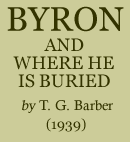< Previous | Contents | Next >
CHAPTER 5.
TRAGEDY.
[1803].
In the early part of 1803, a young nobleman, named Lord Grey de Ruthyn, became tenant of Newstead, and Byron was invited to spend his summer holidays there. It was during his stay at Newstead that he was brought into close touch with his neighbours at Annesley Hall, and succumbed to the charms of Mary Chaworth.
 |
 |
|
| George Gordon Byron. | Mary Chaworth. |
Every morning he rode over the hills to Annesley. He was a welcomed guest at the Hall, and Mary Chaworth did not hide the fact that she looked forward to his visits. She found pleasure in his company, and offered to him what he yearned for more intensely than anything else—companionship. She entertained him with her singing and playing. They wandered together in the park, and often went and sat together on the hill nearby crowned with its diadem of trees. Every day, if weather permitted, they saddled their horses, and galloped over the meadows.
All the time he found her becoming more and more necessary to him. He was lonely, terribly lonely. Dare he hope that she would become the companion of his life? He loved her, there was no doubt about that. Did she love him? Had she given any evidence of it? Undoubtedly, she had. She did not tell him so in so many words, but she made it evident that she delighted in his company, and during his visits she contrived to be alone with him. The charm of his presence and conversation fascinated her; on occasions at night they met clandestinely, and these secret meetings were arranged by the exchange of notes, delivered no doubt by some sympathetic member of the household. She gave him her portrait, and a ring, and bestowed other favours upon him.
Little wonder that the poor boy was encouraged to believe that his love was reciprocated! She knew he loved her passionately and offered no resistance to his advances, in fact she encouraged him in them.
All seemed to be going well, until the handsome hunting squire of Colwick Hall—John Musters—appeared on the scene, and Mary Chaworth transferred her affections to him. Byron wrote afterwards, “the ardour was all on my side. I was serious, she was volatile. She liked me as a younger brother; and treated me, and laughed at me, as a boy.” Pride would not allow him to write otherwise. He was a Byron.
This was the greatest tragedy of his life. It is impossible to dismiss it as a mere boyish infatuation. Byron went away from Annesley with his heart torn, and the terrible wound inflicted by Mary’s rejection of him was never healed.
In 1816—thirteen years afterwards—this episode is made the subject of his arresting poem, “The Dream.” The Poem is tragic and poignant. He writes with bleeding heart. Time has not staunched its wounds. On his pilgrimage by sea and land the image of Mary Chaworth obtruded itself upon his mind, and attuned it to some of his most elevated and beautiful strains.
He leaves Annesley not only with his heart torn but his spirit crushed. What had the future to offer? Did he care?
He had dreamed dreams.
What had become of his dreams? They had faded away in the bitterest disappointment.
and now, his breath, his voice, his sight, his life were gone. To whom could he turn in his agony? There was no one to whom he could pour out his soul. He must bear his agony alone. His heart was broken, but no one should know it. Its secret was sealed. Henceforth his life should be a pose. The spirit of recklessness came upon him. He yielded to it. He would find relief in a “dare-devil attitude” towards everyone and everything. What did it matter? For him the light of life had gone, his “morning star” was eclipsed. The way of darkness was not the way of his choice. His destiny had been arranged for him. Fate, cruel fate, decreed the way he should take. There was no alternative. He must go out into the darkness, all alone—and he went.
We may regret it, but we cannot blame. We have done the same ourselves. Some bitter disappointment has overwhelmed us, and we have gone out into the darkness. Will the light dawn again? Did it dawn again for him?
